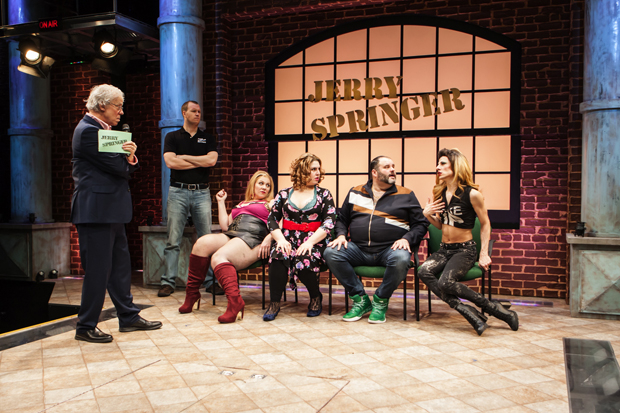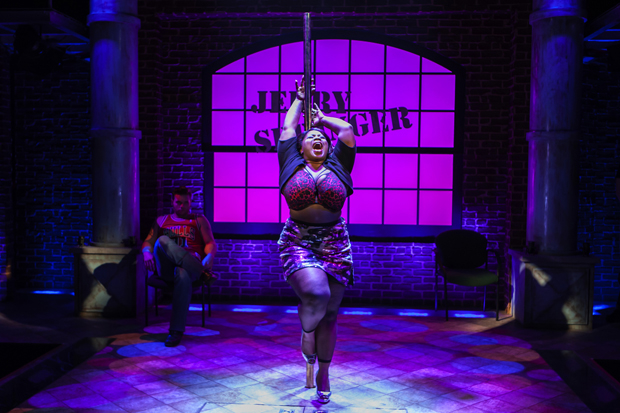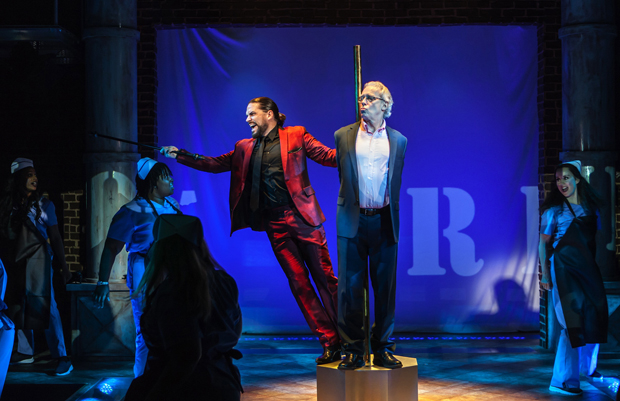You Will Never See Jerry Springer — The Opera at the Met
But you can see it with the New Group in this off-Broadway debut.

(© Monique Carboni)
If you're like me, you haven't thought much about Jerry Springer since the late '90s. In that era of seemingly widespread happiness and prosperity, Springer and his daytime television show put a spotlight on the discontents of our Pax Americana: the fetishists, adulterers, and Klansmen that more respectable programs preferred to ignore. But weren't those unsavory people Americans too? Certainly, Jerry's strong ratings (at one point, he was beating Oprah) indicated that millions of Americans wanted to watch them, if only in morbid fascination. Viewing the New York debut of Jerry Springer — The Opera (produced by the New Group at Signature Center), it is hard not to see The Jerry Springer Show as a harbinger of things to come, especially now that video production and the means to broadcast fit conveniently in one's pocket.
This is more true today than it was in 2003, when Jerry Springer — The Opera first bowed in London. With a score by Richard Thomas, who collaborated on the book with Stewart Lee, this mostly-sung show does somewhat resemble a four-act opera, even though it is really a two-act musical. The first act portrays a typical episode: A man (Luke Grooms) is cheating on his fiancée (Florrie Bagel) with another woman (Beth Kirkpatrick) and a cross-dresser (Sean Patrick Doyle). Additional guests include a guy with the pointedly selected name of Montel (a giddy Brandon Contreras at the performance I attended), who reveals his infantile desires, and a wannabe stripper named Shawntel (Tiffany Mann in a gloriously full-throated performance), who makes her pole-dancing debut. These people are furiously chasing life, liberty, and the pursuit of happiness, and Thomas gives them all beautiful "I want" songs to express that.

(© Monique Carboni)
Presiding over this three-ring circus is former Cincinnati mayor Jerry Springer (Terrence Mann), who justifies his show as "a platform to the marginalized and dispossessed." As portrayed by Mann, he remains an elusive figure, and we're never quite sure if he truly believes the fragile myth he has constructed around his means of income. Certainly, he sees himself as morally superior to his rabble-rousing warm-up man (a maniacal Will Swenson). But a series of musicalized commercials (or "Sadverts") for pharmaceuticals and religion strongly suggest that Springer is not so much a champion for the oppressed as a postmodern P.T. Barnum, exploiting his performers while scamming his audience.
The first act raises huge questions of media ethics in a free and pluralist society. That's why the second act, which abandons them entirely for a puerile send-up of Christian mythology, is such a let-down. It sees Jerry descend to hell to host an episode of his show featuring Satan (Swenson), Jesus (Contreras), and God himself (a soulful Grooms). We learn nothing about what drives Jerry in this surprisingly sleepy second half. We're also not really sure whom in the off-Broadway audience it is offending with its sophomoric sacrilege, beyond those of us who appreciate quality dramaturgy.
This is unfortunate because Thomas is actually a gifted composer, incorporating motifs that smack of Bach and Alban Berg into a toe-tapping musical theater score. Thomas and Lee (who contributed additional lyrics) capture the vulgarity of the Springer vernacular in the libretto, most of which is unprintable, although "Dip me in chocolate and throw me to the lesbians" has to be the most memorable lyric of the season.
Director John Rando stages a zippy production and leads the cast to sincere performances, which are essential for a show like this to be funny. Chris Bailey's energetic choreography utilizes every inch of Derek McLane's thrust set, which re-creates the Springer studio down to each exposed brick while drawing us into the action. Jeff Croiter's lighting easily facilitates the many dimension shifts and inner monologues in the script. And Sarah Laux's costumes are just as trashy and outrageous as you would expect.

(© Monique Carboni)
"Trashy and outrageous" seems to be the driving ethos behind Jerry Springer — The Opera, which will delight many a theatergoer looking for a mindless laugh. Still, if that is all Thomas and Lee are going for, why probe the membrane between visibility and exploitation, as they do so excellently in the first half, at all? By putting all that rich dramatic material on the stage and then walking away from it, they miss a golden opportunity to craft an origin story for the digital race to the bottom, in which broadcast television cannot hope to compete with the zero-standards entertainment offered online. Are we a freer, fairer, and more democratic country for it? You can ask Jerry: He's still on the air, even though his audience has mostly moved on to sicker pastures.








